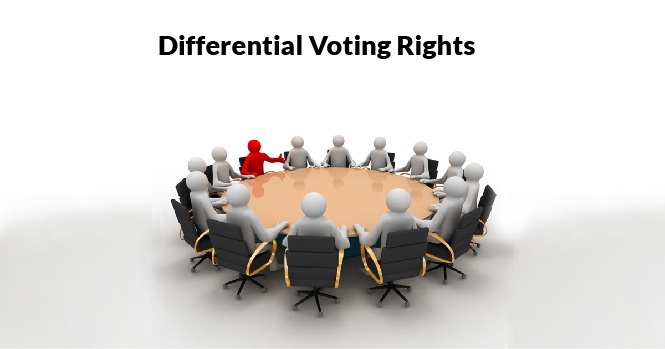
In a fillip to startups, the Ministry of Corporate Affairs (MCA) recently amended the Companies (Share Capital and Debentures) Rules, 2014 (SCAD Rules) which are relaxed norms for shares with Differential Voting Rights (DVR) that will help such companies to retain control while raising equity capital. A differential voting right share is one with higher or lower voting rights but the same economic interest as ordinary shares. Shares with higher voting rights have been used by entrepreneurs around the world to retain control of their companies even while selling ordinary equity to investors to raise capital. The MCA move was long-awaited and follows closely on the heels of the Securities and Exchange Board of India (SEBI) amending the DVR regulations applicable to listed entities. DVRs allowing founders / promoters to have a greater say over decision making with a minority shareholding and help the promoter led companies to raise funds without diluting their holding and enabling them to retain their decision making powers. Such shares have rights disproportionate to their economic ownership and serve as defense mechanism against any hostile bid for change in control.
Below mentioned are the changes amended the Companies (Share Capital & Debentures) Rules under the Companies Act:
Lack of demand for DVRs: The popularity of DVRs among investors has not picked up in the Indian securities market. Even though a handful of listed companies have issued DVRs in the past as highlighted in the Consultation Paper itself, they continue to be traded at a steep discount and they are barely liquid even at that price. This goes to show that Indian investors continue to value their voting rights/powers and are not keen on trading it for higher dividends or other benefits. Because of their unpopularity, domestically there is little empirical evidence with respect to such companies.
Non-convertibility conditions: SCAD Rules currently prohibit a company to convert its existing share capital into DVRs or vice versa. Since the conversion is restricted, promoters or founders may not have the necessary funds at their disposal to subscribe to fresh DVRs required by the SCAD Rules. The inability to convert existing shares would make issuing DVRs virtually impossible for most of the startups. The Government’s rationale for not allowing conversion is that it may raise governance issue and give undue control to promoters or founders. If this rational hold is valid then government could have prescribed governance riders before exercising conversion. There is no rational in restricting conversion as it would not attain its intended purpose of easing startups to raise funds without ceding control.
Removed profitability criteria: The profitability condition is a big hindrance, since none of the leading startups today are making any profits. To remove this anomaly between the Companies Act, 2013 and the SEBI regulation, SEBI permits IPOs of companies without a consistent track record of distributable profits for the last 3 years under Regulation 6(2) of the SEBI ICDR Regulations. The criteria of consistent track record of distributable profits for the last three years have been removed in the amended SCAD Rules.
Issuance of superior right for unlisted companies: DVR can be issued via two ways-one is issuing superior voting rights (SR) under which holder shall have excess voting power above its economic value. Fractional ownership under which holder would get inferior voting rights which are less than its economic ownership. Unlisted companies can issue DVRs via both ways whereas listed companies earlier allowed issuing only fractional voting shares. Now SEBI has allowed issuance of SRs by complying with certain additional corporate governance conditions. The rationale behind not allowing SR was that it may harm the governance and may oppress the minority. Since in the unlisted public companies, there is no general public interest involved there are no restrictions prescribed under the Companies Act, 2013 and SCAD Rules for issuing SR shares but there are certain unlisted public companies which have availed public deposits or having borrowings above certain limit should have some additional governance riders for issuing SR so as to ensure better Governance and prevent the misuse of SR.
Employee Stock Options (ESOP): Employee Stock Options can now be issued by startups to promoters or directors holding more than 10 percent of equity shares for 10 years from the date of their incorporation. The time period for such ESOPs was five years earlier.
The threshold was 26% of total post-issue paid-up equity capital of the company at any point of time so as to align the Companies Act, 2013 provision with the SEBI regulations of DVR; this limit has been increased to 74% of the total voting power at any point of time. This would provide more liquidity to startups without ceding their control. The SCAD Rules already prescribed sufficient measures by providing eligibility criteria for issuance of DVR, also the minority shareholders can still restrict special resolutions, as it requires the nod of 75% member’s approval for passing special resolution. Therefore, the increased threshold would not cause any threat to minority. Though the thresholds are aligned in the SCAD Rules with the SEBI regulation, yet they are not in line with the SEBI regulation. For instance, after 5 years the SR shall be converted to ordinary shares. This may be further being extended to 5 years. These restrictions are not there for unlisted companies under SCAD Rules.
If you are looking for any recent updates, registering your startup, or any compliance associated with DVR, our team of experts can assist you.
We can also assist you in setting up your business in India, accounting, bookkeeping, payroll, auditing, taxation, secretarial compliances, and trademark registration, business structuring and advisory services. If you require any assistance in this regard, kindly click here